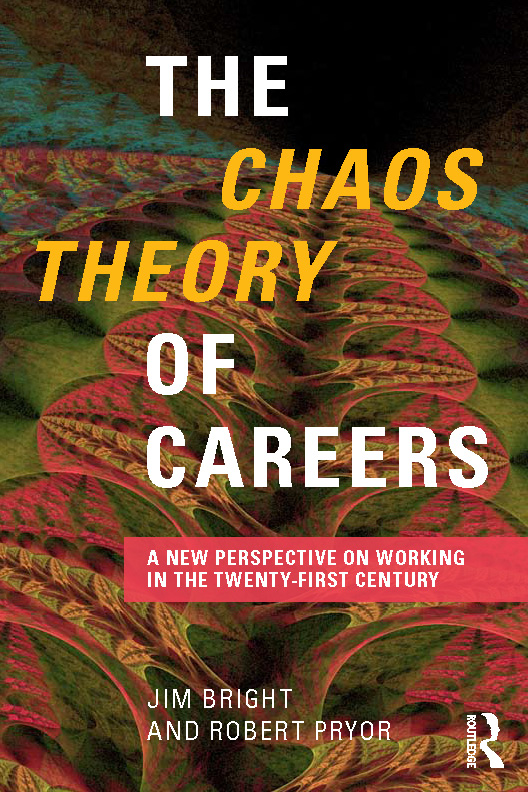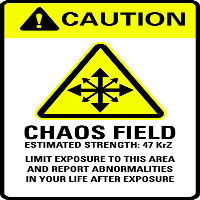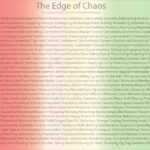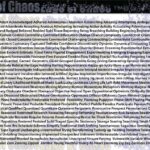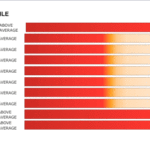The Chaos Theory of Careers says its all down to chance right? So why do you need a career practitioner if it is all chance? So the logic goes that gives rise to the question and title of this blog. It is a question that I am told was asked at a recent CDAA meeting.
Let me give two answers to this question. The first answer is “no, go read our book The Chaos Theory of Careers (Pryor and Bright 2011)”. Those who are convinced need not bother reading any further. My second answer is no and I’ll try to explain why by using the Chaos Theory of Careers to counsel my questioner.
Firstly lets deal with the misapprehensions. The Chaos Theory of Careers (CTC) DOES NOT say it “is all chance” see also this link. The CTC states that there is inherent uncertainty in all actions of a complex dynamical system such as a person operating within and between other complex dynamical systems. However, a feature of CTC is that over time a form of dynamic order emerges, that can be visually represented in a fractal pattern.
A good example of dynamic order is the physical appearance of your face over time. Your face changes as you age, but remains self-similar over time. If it didn’t we could never recognise ourselves in the mirror let alone other people. So our faces are always changing but also maintaining a kind of stability over time. In fact if our faces did not change over time through cell-reproduction, it would mean we have died (and even then it would change through decomposition). Alternatively it means we have had disastrous plastic surgery. But I digress.
So the CTC certainly does suggest that chance events are to be expected and that they should not be considered rare or trivial. One implication that flows from this is that it places severe constraints on rigid plans or goal setting. The CTC says that order and chance are not opposites but are composites. This means we cant live and plan as though everything is ordered and chance wont happen to me. We need to acknowledge the chance in our lives and careers. The question becomes how do we go about doing this?
My questioner has expressed a view of chance that is not uncommon. They have implied that the appropriate response to chance is to give up and become fatalistic. Both myself and co-author Robert Pryor have observed this response amongst some of those who have sustained a workplace injury. In effect they choose to see themselves as one of “luck’s victims”.
This response amounts to fatalism – the view that there is nothing one can do to influence the course of one’s life. Such thinking is often a reflection of a person caught in Pendulum Attractor thinking. In the CTC, we set out 4 different “Attractors” which describe the varying amounts of constraints people place on their thoughts and behaviours. Those who display Pendulum Attractor thinking tend to see things as being either black or white. In this case, the questioner seems to construe life as Chance as equating to being all out of control, whereas Order implies control. I might even want to administer the Change Perception Index (Bright & Pryor, 2005 see this link to get a second opinion on this hypothesis as this is one of the things (amongst 9 others) that this psychometrically validated instrument measures.
The counselling challenge then is to help the questioner re-conceptualize chance events. Bright, Pryor, Chan & Rijanto (2009) demonstrated that when considering chance events, people have a bias towards recalling events that are high impact and over which we have little or no control. For instance being in a motor vehicle accident as a passenger and being severely injured.
However as Bright et al (2009) point out, there are other types of chance event. Specifically there are two types of chance event that have high levels of personal control. For instance, imagine you go to a party and a fellow guest you’ve just met, offers you a job and tells you to call their office the following day. This is a chance event where you have as complete control as reasonably possible over whether you take up the invitation or not. You also have more or less complete control over some more trivial chance events, such as noticing a $5 note on the pavement of an otherwise empty street.
The trouble is as Bright et al (2009) point out, we tend to forget these high control events more quickly than the low control ones. This in turn fuels a tendency to construe chance events as being out of our control and it is a short step to fatalism from there.
The good news is that we experience far more of the high control chance events than the low control ones. Clearly because there is a high degree of control in such events, there is a lot of scope for Practitioners to assist their clients with strategies and techniques to leverage such events. This may include networking, social media, job application assistance, promotional or profile raising activies and so on. In fact the sorts of thing that Practitioners routinely undertake with and on behalf of their clients.
Once I’ve discussed this perspective on chance events, I might use the Luck Readiness Index (Pryor & Bright, 2005) to gauge my client’s Flexibility, Strategy, Optimism, Persistence, Efficacy, Risk, Curiosity and Luckiness. It should be fairly clear why helping my client develop a more Flexible, Optimistic, self efficacious and strategic approach to the complexities of an uncertain world could prove important.
Then I might work with my client in helping to develop their own creative solutions to their career dilemmas. I might do this using the Creative Thinking Strategies Card sort (see this link) (Bright & Pryor, 2005).
The appropriate response to uncertainty in the world and in our careers is not simply to give up and become fatalistic. Nor is it ideal to thole the uncertainty by merely trying to cope. As Robert Pryor pointed out in a recent conference paper to the Society of Rehabilitation Counsellors, the CTC allows clients to go beyond coping into developing the skills of personal creativity to allow them to reinvent themselves or creatively re-arrange their transferable skills so that they can offer a more varied and changing proposition to a labour market increasingly demanding changing and variable skills.
In being adept at being personally creative, we learn to survive and thrive living on the edge of chaos, and in so doing allow ourselves a better opportunity to take opportunities that present themselves and to respond positively to both expected and unexpected change.
So far from Practitioners being made redundant by the Chaos Theory of Careers, quite the opposite is true. The CTC practitioner has a major role to play in assisting their clients confront and embrace the complexities of their lives. When we formally evaluated the CTC counselling approach by comparing it to a more traditional interests-inventory and vocational recommendations type approach, not only did the CTC score higher on every success and satisfaction measure, it continued to do so 1 month later. The counselor doing the CTC counselling reported finding the CTC sessions far more engrossing and stimulating (McKay, Bright & Pryor, 2005).
The CTC is ultimately as much a theory about order as it is about disorder, because those elements of careers are composites. The problem with theories that have gone before is that they have generally over-estimated the amount of control or agency that a person has, while simultaneously under-estimating the inevitability and impact of continuous and non-linear change. The CTC provides a principled framework for understanding why and how change operates in careers, and we have also begun to provide a series of empirically evaluated and validated counselling techniques, concepts, card sorts and tests that can be usefully employed by practitioners to assist their clients in a more effective and relevant fashion that addresses the world as it is now.
The CTC will not do Practitioners out of their jobs, but it may for some provide an exciting opportunity to alter and expand their jobs in a way that is deeply satisfying, relevant and effective.
References
- Bright, JEH & Pryor, RGL (2005). The Complexity Perception Index. Bright & Associates/Congruence.
- Bright, Pryor, Chan, Rijanto. (2009). The dimensions of chance career episodes. Journal of Vocational Behavior. 75(1), 14-25.
- McKay, H., Bright J.E.H. & Pryor R.G.L. (2005) Finding order and direction from Chaos: a comparison of complexity career counseling and trait matching counselling. Journal of Employment Counseling. 42, (3) Sep 2005, 98-112
- Pryor, RGL & Bright, JEH (2005). The Luck Readiness Index. Congruence/Bright & Associates.
- Pryor, RGL & Bright, JEH. (2011). The Chaos Theory of Careers. Routledge.
Related Posts


